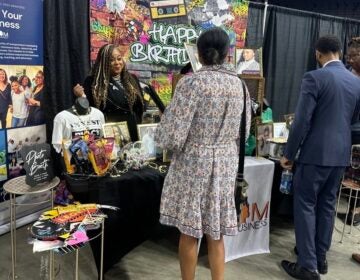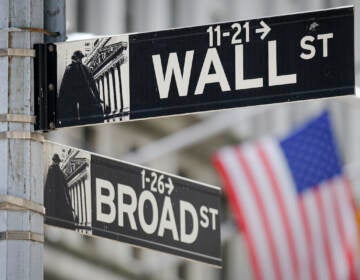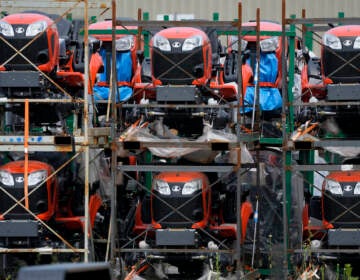U.S. may follow Philly and New Jersey to ban cashless businesses
Two Democrats in Congress have introduced bills that would bar brick-and-mortar businesses nationwide from rejecting cash.

Two Democrats in Congress have introduced bills that would bar brick-and-mortar businesses nationwide from rejecting cash. (Jeff Chiu/AP Photo)
Earlier this year, Philly and New Jersey passed laws banning cashless businesses, restaurants and retail shops where customers can only pay with plastic or their phones. Now, two Democrats in Congress want the country to follow suit.
New Jersey U.S. Rep. Donald Payne, D-Newark, recently introduced Payment Choice Act, which would require businesses to accept cash so customers without bank accounts — collectively called the “unbanked” — aren’t barred from shopping anywhere because they can’t pay with cards or electronically.
The measure would impose fines on businesses that don’t comply and allow customers to sue stores that refuse to accept cash.
Payne could not be reached for comment Friday. In a statement, the lawmaker said “low-income, minority, or immigrant people often are unbanked for a variety of reasons. The high maintenance fees of bank accounts are just one reason. Additionally, many people in my district and around the country are still suffering the aftereffects of the 2008 recession. As a result, their access to credit and credit cards is hindered.”
Rhode Island U.S. Rep. David Cicilline has introduced a similar measure dubbed The Cash Should Always Be Honored Act. Under the measure, the Federal Trade Commission would implement the ban with newly created regulations.
Cicilline did not return a request for comment.
In February, Philadelphia became the first big city in the country to bar brick-and-mortar businesses from operating in the city if they refuse cash. The law takes effect on July 1.
Less than a month later, New Jersey Gov. Phil Murphy signed legislation barring the practice in the Garden State. Only Massachusetts has a similar ban.
City Councilman Bill Greenlee, who introduced the bill in Philadelphia, said he never thought the idea would reach the national stage, but he’s glad it’s “struck a nerve” with people.
“I think the fairness issue if I was gonna sum it up in one word is the thing that hit a note with people,” said Greenlee.
Commerce groups and cashless business owners say the government shouldn’t have a say in how private businesses operate, and that customers ultimately have the choice not to shop at a cashless business.
In an interview with WHYY last year, Nick Stone, founder of Bluestone Lane, a coffee shop chain, said he decided to stop accepting cash because the overwhelming majority of his customers — more than 90% paid with a debit or credit card. While running a cashless business can be more expensive because of transaction fees, Stone said lines move faster when employees don’t have to make change. It also simplifies bookkeeping, he said.
Consumer advocates have also expressed concerns about banning cashless businesses, saying the government should instead focus on helping people participate and navigate in the digital economy through financial literacy efforts.
Stephen Harkey, chief marketing officer for ViviPay, a Florida-based company that offers low-income residents low-barrier digital bank accounts, said banning cashless businesses is a good idea— “you should be able to use cash anywhere.”
Still, he said Payne and Cicilline’s bills don’t do enough. To him, there’s so much more that could be done to help the unbanked, who often turn to prepaid debit cards and money orders to pay their bills.
“While it’s admirable what they want to do…it would be a lot better if they could figure out a way to get these people into the banking system where they have the ability to cash a check, pay bills online and not get charged ridiculous fees,” said Harkey.
Roughly 6% of American households lacked a bank account in 2017, according to a federal survey.
WHYY is your source for fact-based, in-depth journalism and information. As a nonprofit organization, we rely on financial support from readers like you. Please give today.





